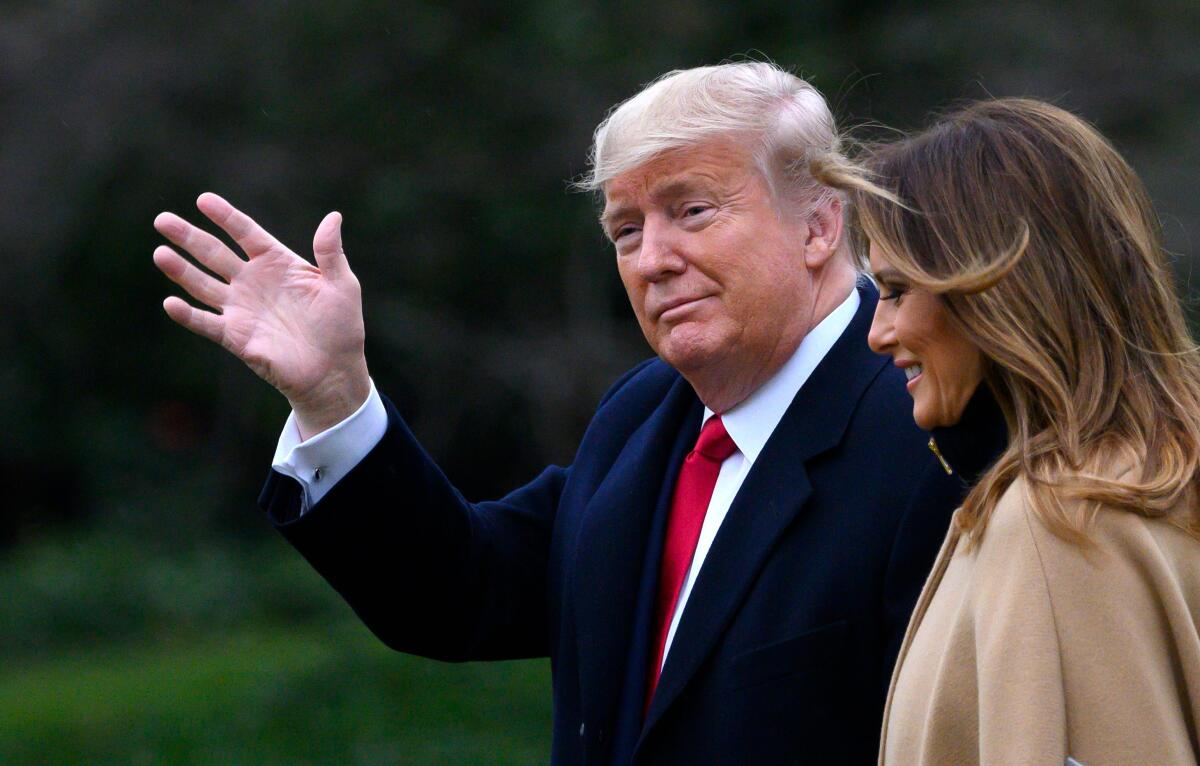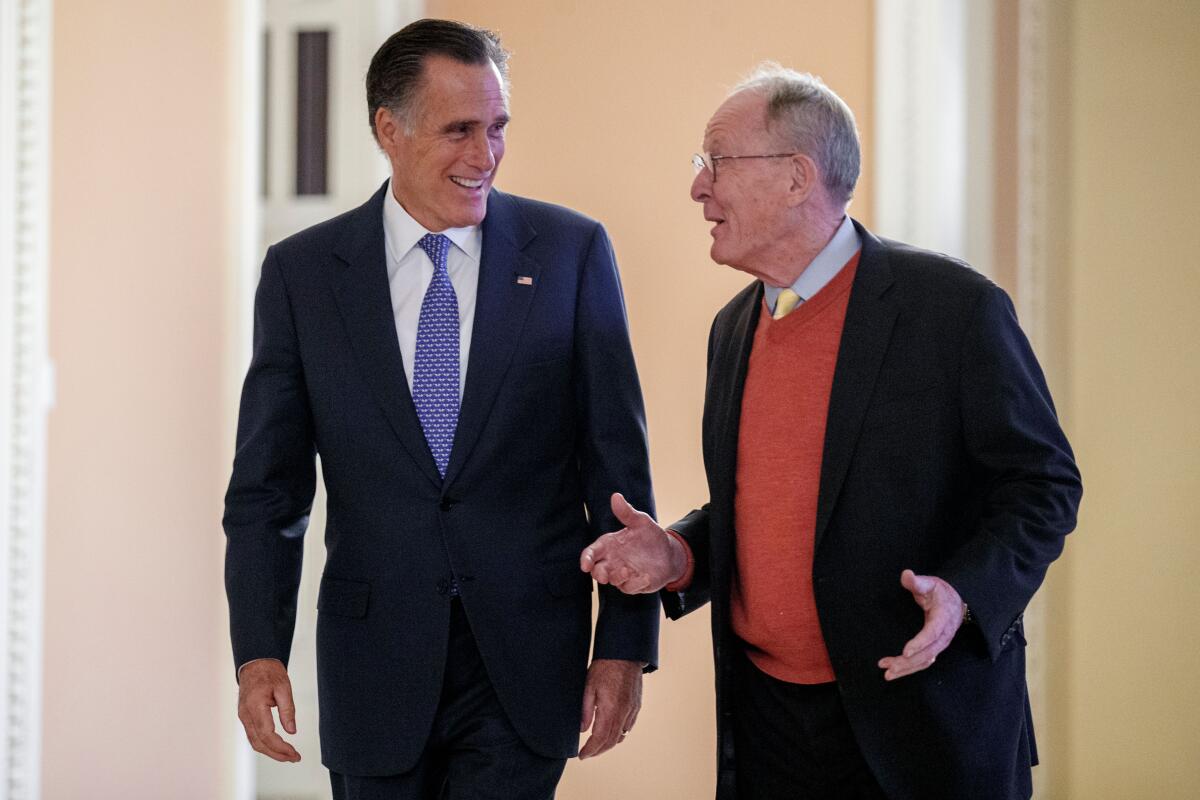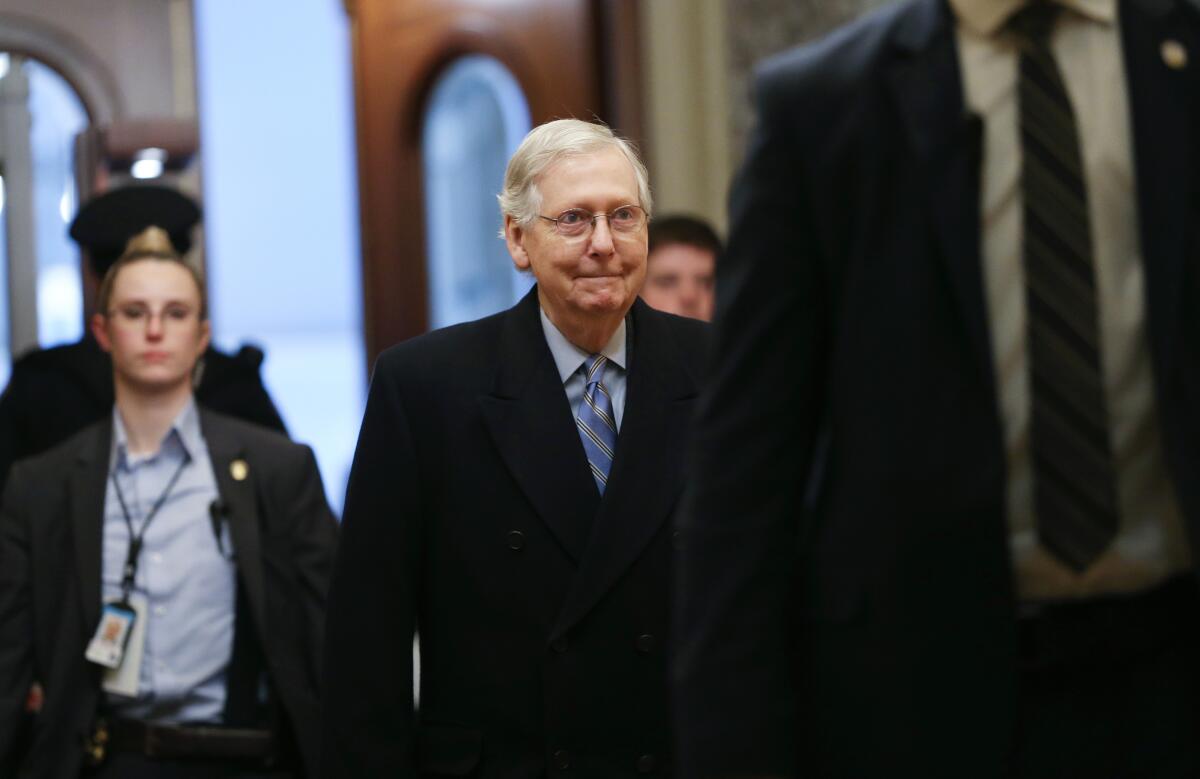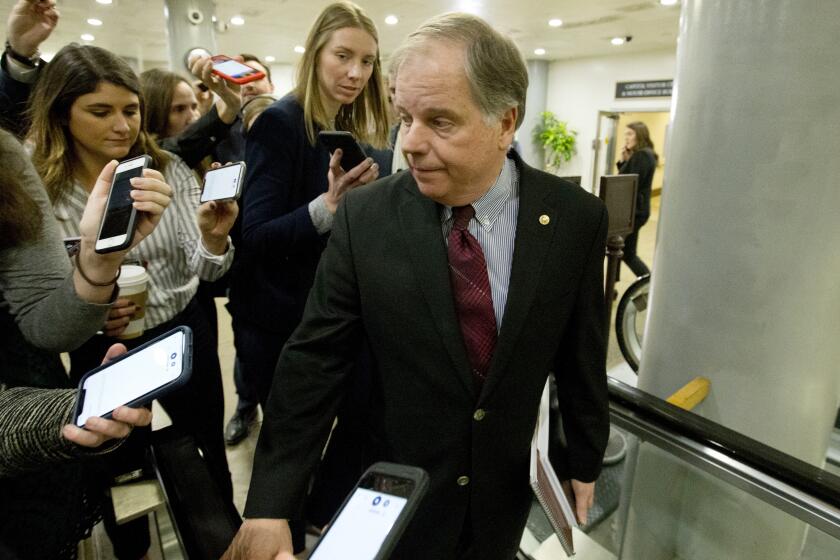Republicans who once scorned Trump rally to save his presidency

- Share via
WASHINGTON — A decade ago, Donald Trump was a registered Democrat. When he joined the presidential race as a Republican in 2015, party leaders scorned him as a gatecrasher and sought to stop his rise.
The same Republican establishment now has rescued Trump’s presidency.
After a vote Friday that blocked new witnesses, the Republican-controlled Senate is all but certain to acquit him Wednesday, formally ending the nation’s third and shortest presidential impeachment trial. That will let Trump remain in office and become the first impeached president to run for reelection.
A handful of Democrats haven’t said publicly how they will vote in Trump’s Senate impeachment trial.
The acquittal will not only cement Trump’s reputation for surviving an onslaught of political perils. It also highlights how the former political neophyte has come to utterly dominate the GOP, with Republican lawmakers bowed by his overwhelming popularity with the party’s base.
“He has taken over the party in very short order,” said Neil Newhouse, a Republican pollster. “It was almost immediate after he won the election. He’s a force of nature among Republicans.”
If the Senate threw Trump overboard, “there might be a revolt” from Republican voters, he said.
Trump’s acquittal was never really in doubt in the Republican-controlled Senate. Even Republicans who disapproved of his dealings with Ukraine, the heart of the House impeachment charges, said it did not merit making him the first president ever removed from office.
“Just because actions meet a standard of impeachment does not mean it is in the best interest of the country to remove a president from office,” Sen. Marco Rubio (R-Fla.) said Friday.
Sen. Lamar Alexander (R-Tenn.), whose decision late Thursday to oppose calling witnesses was a turning point in the trial, conceded that Democrats had proved their case that Trump pressured Ukraine last year to investigate a political rival by withholding $391 million in security aid.
But Alexander said the charges did not warrant removing Trump from office. Among other reasons, he said, the process was too partisan, with no Republicans joining the House Democrats who impeached Trump on Dec. 18.

The partisan split was by design. Trump has demanded a kind of political and personal loyalty that his predecessors could not envision, lashing out on Twitter when even loyal defenders step out of line, and claiming unmitigated victories when they stick by his side.
At recent rallies, he claimed he “won” the House impeachment vote unanimously, citing the 196 Republicans who voted against articles of impeachment — without mentioning the 228 Democrats and one independent — former Republican Rep. Justin Amash — who voted in favor in both articles.
Alexander’s political mentor, the late Sen. Howard Baker, helped seal President Nixon’s fate in 1974 during Watergate, asking famously, “What did the president know and when did he know it?” Republicans ultimately concluded they had a duty to tell Nixon he faced certain impeachment and removal by Congress if he did not step down.
“I hit him as hard and as directly as I could,” Sen. Barry Goldwater, the Arizona Republican, wrote in his memoir, describing how he told the Republican president he would get no more than 15 Republican votes if his case reached the Senate. Nixon announced his resignation the next day.
Senate Majority Leader Mitch McConnell (R-Ky.), by contrast, appeared on Fox News with Trump’s favorite media figure, Sean Hannity, just as the impeachment trial was reaching the Senate and all but pledged his fealty to the White House.
“I’m going to take my cues from the president’s lawyers,” McConnell said.
Experts say the messaging of Lin-Manuel Miranda’s musical is appealing to both liberals and conservatives.
It wasn’t always thus. Many of the senators who backed Trump at the trial had denounced him bitterly during the 2016 campaign.
Sen. Lindsey Graham (R-S.C.), now one of Trump’s closest allies, called him “a race-baiting, xenophobic, religious bigot” who “doesn’t represent my party.”
“The president was viewed as a novelty who was going to, at best, bring more interest to the party and, at worst, tear it down in glorious fashion,” said Sam Nunberg, a former Trump campaign advisor.
Al Cardenas, a former chairman of the American Conservative Union, said Trump “doubled down” on the intense anger that swept the GOP after the 2007-09 financial crisis and Barack Obama’s election in 2008, spawning the tea party movement on the right. Republicans fed off that frustration to take power on Capitol Hill after 2010, thwarting much of President Obama’s legislative agenda.
Two years after Trump was elected, Democrats retook the House, allowing for his impeachment.
Under Trump, Republican lawmakers have jettisoned — at least for now — long-held views on the danger of deficit spending, the need for comprehensive immigration reform and the threat from Russia, among other issues. But they also have stocked federal courts with young, conservative judges and passed a tax cut bill, both hugely popular with Republican voters.
Lawmakers who disapprove of Trump’s conduct have decided to “swallow hard” and accept it, Cardenas said, rather than risk losing his support and maybe even control of the Senate.
“They believe that you support the Republican Party no matter what,” said Cardenas, who is a Trump critic.

Many Republicans compared the impeachment to the bitter Senate fight over Brett M. Kavanaugh’s nomination to the Supreme Court in 2018. Though a respected judge, Kavanaugh nearly lost his confirmation vote over allegations of a sexual assault of a girl when they were both high school students decades ago, which he vehemently denied.
Though Kavanaugh ultimately prevailed, the grueling experience convinced many Republicans that they needed to unite to withstand bruising fights with liberals, whom they accuse of a systematic effort to tar conservatives.
Republican lawmakers contend that they are acting in the interests of their constituents and their party, and not out of fear of Trump’s wrath on Twitter.
Rep. Adam B. Schiff (D-Burbank), the lead House manager in the impeachment trial, outraged some Republican senators when he cited a media report that claimed a White House aide had warned Republicans that “your head will be on a pike” if they crossed the president.
But days later, Chris Christie, the former New Jersey governor who backed Trump in 2016, publicly suggested that Trump might encourage primary challenges as political revenge against Republicans who failed to support him at the trial.
Trump has already shown his power to cast out dissident Republicans. Two senators, Bob Corker of Tennessee and Jeff Flake of Arizona, both decided not to run for reelection rather than face voters after clashing with Trump.
John Bolton, an archconservative who served 17 months as Trump’s national security advisor, is the latest example.
He reportedly wrote in an unpublished memoir that Trump directly tied resumption of military aid for Ukraine with his demand for investigations of Democratic rival Joe Biden, the heart of the impeachment case. Trump has denied any linkage between the two.
Bolton offered to testify under oath to the Senate, but Senate Republicans rallied to prevent him from testifying. Only two broke ranks.
Republicans feared Bolton’s prospective testimony “could potentially blow up, and cause another shoe to drop and lead to pandemonium,” said Ken Gormley, president of Duquesne University in Pittsburgh and the author of a book about the Watergate scandal. They didn’t “want to take that risk.”
Instead, Trump and his allies turned on Bolton with a fury, calling the longtime party stalwart a “deep state” tool, a turncoat and worse. The White House also vowed to block publication of his book, saying it contained classified material.
The Republican Party “is a cult of personality at this point,” said Sen. Christopher S. Murphy (D-Conn.). “I wish Republicans remembered what they all said during the campaign, when they previewed how reckless and irresponsible it would be to make him their nominee.”
Whether Trump’s impeachment and trial will help or hurt him in November is unknown. Some suggest it will do neither, becoming just another scandal for a president who seems to thrive on them.
“We’ve gotten to a point where presidential elections are decided by very small percentage points,” said Rep. Mark Meadows (R-N.C.), a vocal Trump supporter. “If you look at where everybody is on this issue, it’s pretty much where we were in 2016. I don’t know that that’s going to change greatly.”
Times staff writer Jennifer Haberkorn contributed to this report.
More to Read
Get the L.A. Times Politics newsletter
Deeply reported insights into legislation, politics and policy from Sacramento, Washington and beyond. In your inbox twice per week.
You may occasionally receive promotional content from the Los Angeles Times.














